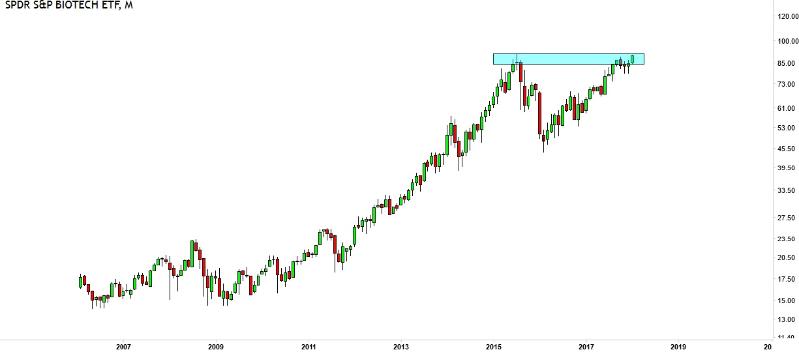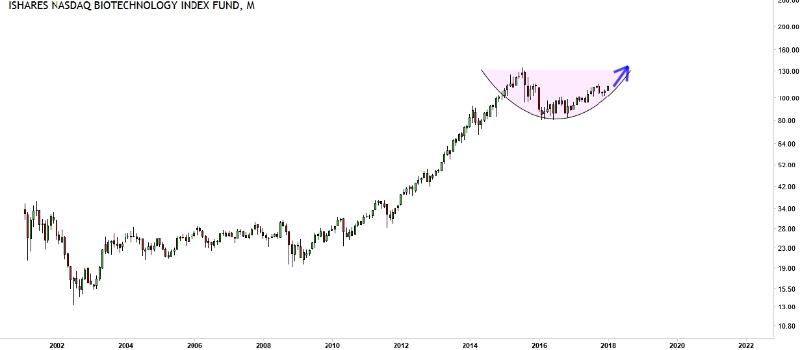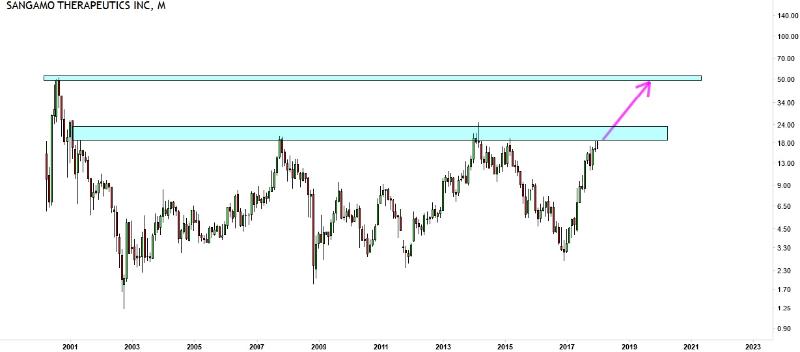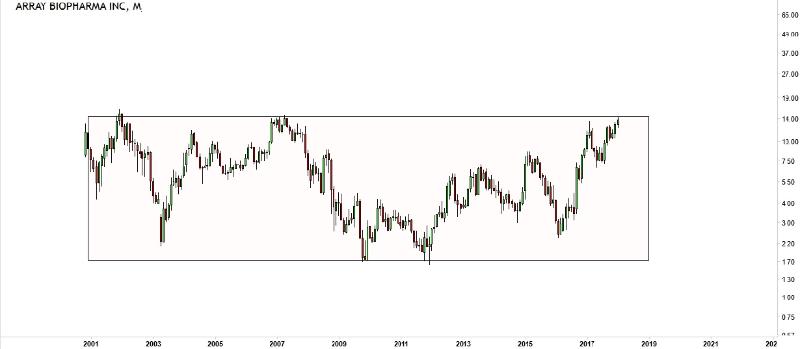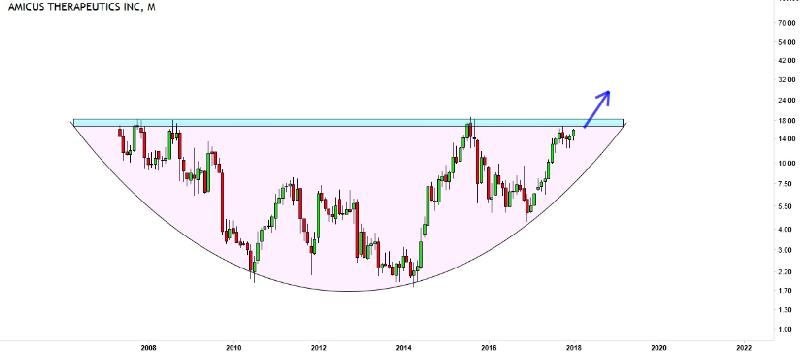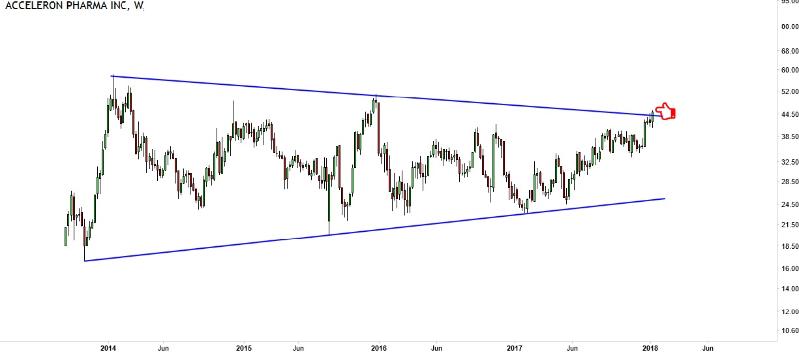Biotechnology and pharmaceutical companies have always been confused by most people since both of them are a sub-industry of the healthcare sector. Though both produce medicine, biotechnology companies’ drugs have a biological basis while medicine from pharmaceutical companies have a chemical basis. When it comes to stock price of biotechnology companies, they tend to move on news related to their medicine being accepted or rejected for the next or final phase of clinical trial, next to earning reports and M&A activity.
Despite President Donald Trump’s criticism on biotechnology and pharmaceutical companies over high drug prices and extravagant price hikes it didn’t seem to have a very destructive effect on these stocks. On the contrary even, InvestingHaven’s research team detected that smart money was rotating into the biotechnology industry. 2 biotechnology ETFs gave some clue of what to expect for the industry.
Monthly chart of XBI
The SPDR S&P Biotech ETF (XBI) tracks an equal-weighted index of US biotechnology stocks, focuses exclusively on American stocks, and primarily consists of mid cap and small cap securities. As can be seen from the monthly chart, price is in the process of breaking through the previous resistance. And this could lead to more upside of the constituent stocks.
Month chart of IBB
The iShares Nasdaq Biotechnology ETF seeks to track the investment results of an index composed of biotechnology and pharmaceutical equities listed on the NASDAQ. It spreads the exposure across large caps, mid-caps and small cap stocks. Since IBB (IBB) has some weighing in pharmaceutical companies, we combine both XBI and IBB to give an overall picture of the biotechnology sub-industry.
Although the monthly chart of IBB is far away from a convincing breakout there is a potential U consolidation pattern and could make the price drift higher that ultimately leads to a breakout. This is what InvestingHaven’s team is good at: lowest entry point with maximum upside benefit. Just in case price breaks down below the U pattern, the consolidation could take much longer.
We examine 4 biotechnology stocks in this article.
Biotechnology stock #1: Sangamo Therapeutics Inc (NASDAQ: SGMO)
SGMO is a clinical stage biotechnology company that translates ground-breaking science into genomic therapies transforming patients’ lives using platform technologies in genome editing, gene therapy, gene regulation and cell therapy It is anticipated that gene therapy will play an important role in future of cancer therapy as part of a multimodality treatment, in combination with, or following other forms of cancer therapy, such as surgery, radiation and chemotherapy. The type and mode of gene therapy will be determined based on an individual’s genomic constituents, as well as his or her tumour specifics, genetics, and host immune status, to design a multimodality treatment that is unique to each individual’s specific needs. With the latest announcement of collaboration between SGMO and Pfizer to tackle ALS – a disease that affects nerve cells in the brain and the spinal cord, SGMO looks to have positive outlook in time to come.
Monthly chart of SMGO
The monthly chart of SGMO depicts that price has been consolidating in a triple bottom formation between 2.5 – 18.3 since 2001. After being rejected at 18.3 for the last three times, price is making an aggressive attempt to break through this level. Our bullish upside target: we see price hitting ~33 by end of 2018 whereas if a nasty rejection happens again. The flipside: price could drop back to ~9.
Biotechnology stock #2: Array BioPharma Inc. (NASDAQ: ARRY)
Incorporated on February 6, 1998, is a biopharmaceutical company focused on the discovery, development and commercialization of targeted small molecule drugs to treat patients afflicted with cancer. The Company has approximately five registration studies that are advancing. Its programs include approximately three cancer drugs, binimetinib (MEK162), encorafenib (LGX818) and selumetinib (partnered with AstraZeneca). Binimetinib is a mitogen-activated protein kinase (MEK) inhibitor for cancer, which is in Phase III trial; encorafenib is a BRAF inhibitor for cancer, which is in Phase III trial, and selumetinib is a MEK inhibitor for cancer, which is in Phase III trial. The information about Clinical Phase I – IV trial can be found here. Collaboration project with other pharmaceutical companies includes Bristol-Myers Squibb, Merck and Pfizer
Monthly chart of ARRY
Since its inception in 2001 the monthly price chart of ARRY has been consolidating to present into what we called a rectangle where the price of this stock was rejected thrice near 14.4 while support level is 1.6-2.2. Breaking the multi-year resistance of 14.4 could see price propels to 2018 target of ~25 while if the attempt to break above 14.4 fails again this could tip towards slightly bearish outlook and 12.2 will be the immediate support followed by 9.5 and 7.2 respectively.
Biotechnology stock #3: Amicus Therapeutics (NASDAQ: FOLD)
FOLD is a biopharmaceutical company developing novel, oral therapeutics known as pharmacological chaperones for the treatment of a range of devastating rare and orphan diseases. Pharmacological chaperone technology involves the use of small molecules to restore or improve biological activity in cells by selectively binding to misfolded, unstable proteins caused by genetic mutations. This technology represents a novel, next-generation approach to the management of human genetic diseases and offers the potential to improve treatment options for many patients. The company believes pharmacological chaperone technology has broad applicability and expects to expand the portfolio to include other diseases of neurodegeneration, metabolic diseases, and oncology.
Amicus and Biogen Idec have entered a collaboration to discover, develop and commercialize novel small molecules for the treatment of Parkinson’s disease. On top of that, Amicus has received several multi-year grants from the Michael J. Fox Foundation (MJFF) to investigate pharmacological chaperones for the treatment of Parkinson’s disease. Ongoing preclinical studies of the pharmacological chaperone AT3375 for Parkinson’s disease are funded in part by the MJFF
Monthly chart of FOLD
The stock price of Amicus has almost completed a cup and handle bottoming pattern. Immediate resistance of 17.8 had been tested thrice. The 11-year bottoming structure looks to provide the power for a 4th attempt to break this resistance. Should this level give away this time, our 2018 projection for FOLD is ~30. For the downside, if the resistance still remains strong and rejection happens, ~12.35 will provide important support. A failed attempt could bring the price to ~9.7
Biotechnology stock #4: Acceleron Pharma Inc (NASDAQ: XLRN)
Based in Boston Massachusetts, XLRN operates as a biopharmaceutical company, engages in developing, manufacturing, and commercializing novel biotherapeutics that modulate the growth of bone, muscle, fat, and the vasculature to treat musculoskeletal, metabolic, and cancer-related diseases. Besides several clinical phase I & II clinical trials in progress, XLRN is also running a collaboration project with biotech and healthcare behemoth Celgene Corporation (NASDAQ: CELG) dating back to year 2008.
Monthly chart of XLRN
Over the past four years since XLRN began trading on the Nasdaq, price has been consolidating in a massive triangle as shown on the weekly chart. There is high probability that the downtrend line resistance of 45 will be broken convincingly which could see price making an attempt to breach the previous all-time high of ~57.3. On the flipside: if this breakout turns into a fake out, be prepared to see the price retrace to ~39.66 as an immediate support. Below this level the outlook will no longer be bullish but back to consolidation mode.
Please note that there is a little time difference between price of stock at the time of writing to the time this article is published. You are strongly advised to consult a doctor on the medical jargon next to your financial advisor in case you want to invest in one of these biotechnology companies.


